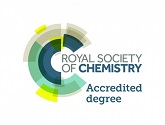BSc Chemistry
-
UCAS code
F100 -
A level offer
BBB -
Year of entry
2027/28 See 2026/27 entry -
Course duration
Full Time: 3 Years
-
Year of entry
2027/28 See 2026/27 entry -
Course duration
Full Time: 3 Years
This BSc Chemistry degree offers you a broad education in chemistry and provides you with the skills to succeed in a range of professions.
This degree provides solid training in chemistry and equips you with key transferable skills.
You will spend your first two years learning the core subjects that all chemists need to know. Topics include trends in the periodic table, carbonyl group chemistry and chemical kinetics. You will be taught by internationally leading experts through a combination of lectures, lab classes, workshops and tutorials. 93% of our students said teaching staff have supported their learning well (National Student Survey 2025, 93.3% of responders from the Department of Chemistry).
In your final year you will study more advanced topics influenced by the cutting-edge chemistry taking place around you. The Department's staff specialise in a number of areas including analytical chemistry, synthesis, polymers and advanced materials, surface science and computational drug design, providing a wide range of options for your final year research project. You will also have the opportunity to participate in academic research. and can work alongside our world-class researchers.
Additionally, if you are interested in teaching as a career, we offer a school-based project in your final year. Students spend one day a week for two terms working alongside both teachers and pupils on an individual project. This project gives you the necessary experience for teacher training applications and helps develop your professional skills for careers which involve working with people.
All our courses are accredited by the Royal Society of Chemistry (RSC).

Placement
We have a dedicated placements officer who is able to advise on career options, CVs and letters of application, as well as to help you find a placement. We have previously sent students to companies such as Coty (Rimmel), Dow Corning and GSK. Students have also been placed at foreign research institutions such as the University of Zaragoza, Aarhus University, the University of South Australia and NASA.

